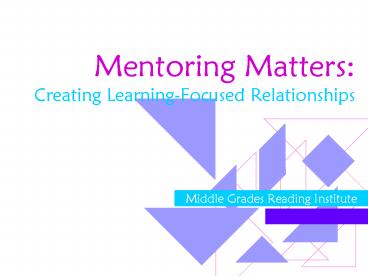Mentoring Matters: Creating LearningFocused Relationships - PowerPoint PPT Presentation
1 / 20
Title:
Mentoring Matters: Creating LearningFocused Relationships
Description:
Collective study and application of research-based practices can increase the ... Focus on the collective analysis of student work/performance ... – PowerPoint PPT presentation
Number of Views:45
Avg rating:3.0/5.0
Title: Mentoring Matters: Creating LearningFocused Relationships
1
Mentoring MattersCreating Learning-Focused
Relationships
- Middle Grades Reading Institute
2
First and Foremost
- Teachers benefiting from skilled mentoring are
more likely to - Increase their efficacy as instructional
problem-solvers and decision-makers - Engage in collaborative professional exchanges
regarding improved practice - Remain in the teaching profession
3
The Mentors Role
- LEARNING-FOCUSED mentoring relationships make a
significant emotional and intellectual difference
for teachers in their new and continuing
practice. - Clearly structured entries into the profession
frame the learning journey toward expert
teaching.
4
Beliefs and Assumptions
- Classroom instruction is a powerful influence on
student achievement. - A deeper, more accurate understanding of the
processes of teaching subject matter enables
teachers to design and deliver more effective
instruction. - Teachers can benefit from the study of
research-based practices if they are provided
with support and structured learning experiences.
5
Beliefs andAssumptions
- Teacher learning is strengthened by
collaboration, peer coaching and collective
action that takes place in a small group setting.
- One-on-one interaction between a study team
coach/mentor and individual teachers makes a
significant impact on teacher learning and
effectiveness. - Collective study and application of
research-based practices can increase the
effectiveness of nearly all instructional
programs.
6
Lifelong Learning
- We dont learn to teach
- We learn from our teaching.
7
CognitiveDevelopment
- Developing higher level thinking is a major goal
of skillful mentoringThere are numerous studies
correlating teachers conceptual development with
improved outcomes for students.
8
Reflecting Conversations
- Reflecting conversations consolidate and extend
professional thinking and habits of mind. They
can occur after specific events such as lessons
or meetings, or at scheduled intervals to reflect
upon patterns of teaching practice and student
learning.
9
Expert Teachers
- Teachers at higher conceptual levels
- Are more able to read and flex in the classroom
- Are continually adapting the learning
environment and methods to better meet the needs
of individual students - These greater conceptual abilities make expert
teaching possible.
10
Building Teacher Capacity Through Mentoring
- Knowledge of Self
- Knowledge of the Structure of the Discipline
- Knowledge of Teaching Skills and Capacities
- Knowledge of Learners and Learning
11
Study Groups at Work
Setting targets for improved performance
Comparing performance to standards or goals
Looking at data together
Creating and implementing action plans
Measuring the results
12
Characteristics of Effective Study Groups
- A clear, agreed upon purpose
- An understanding of and commitment to collective
inquiry - A commitment to collective action
- A willingness to experiment
- A focus on results for students
13
7 Effective Communication Skills
- Pausing (to think)
- Paraphrasing
- Probing for specificity
- Putting ideas on the table
- Paying attention to oneself
- Presuming positive intentions
- Pursuing a balance between advocacy and inquiry
14
What is the work of study groups?
- Analyze data that describe student learning
(including students perspective) - Compare current levels of student learning to
standards or goals - Identify and prioritize areas of strengths and
weaknesses relative to those standards - Devise and implement actions to improve
instruction - Measure the results of the changes they make in
instruction.
15
Strategies Successful Study Groups Use
- Collective analysis of student work
- Observation of each others students during
instruction and practice - Videotaping
- Responses of students during instruction
- Instructional behaviors of teachers
- A year-long topic of study
- Case-based learning to inform practice
- Support recourses to meet goals/outcomes
- A solutions-focused approach
- Protocols or rubrics
- Professional Development Training
16
A Guide to Successful Study Groups
- Use a Thinking Framework to establish clear
goals - Encourage the use of reflective dialogue
- Focus on the collective analysis of student
work/performance - Use multiple professional development strategies
- Recognize all study team members as equals
- Use Reflective Feedback" to assess the goals of
each study group and to transfer learning to
action
17
A Guide to Successful Study Groups
- Keep the group small3 to 6 members
- Meet weekly or bi-weekly (regular, scheduled
meetings) - Establish group norms revisit routinely
- Rotate study group leadership among members
- Use a plan of action to guide study group work
- Complete a reflection at the end of each study
group meeting - Utilize a range of communication strategies
18
Developing these Characteristics
- Knowledge always serves as the foundation for
action and commitment. - Modeling provides a confidence-boosting image of
themselves as successful. - Support increases the likelihood that study team
members will not give up. - Accountability is the mirror image of support it
increases the likelihood that people will follow
through on their commitments. - Feedback is necessary to change behavior.
19
Benefits for Students
- Improved student learning
- Increases student clarity about student outcomes
- Students perspective is used by teachers to
improve instruction and enhance learning
20
Benefits for Educators
- More effective instructional strategies in our
repertoire - Collaborative sharing and gathering of expertise
- More effective use of data to drive improvement
in instruction - Increased professional knowledge about
curriculum and instructional approaches - Commitment and confidence in ability to promote
student learning - Building critical awareness and self-assessment
skills































